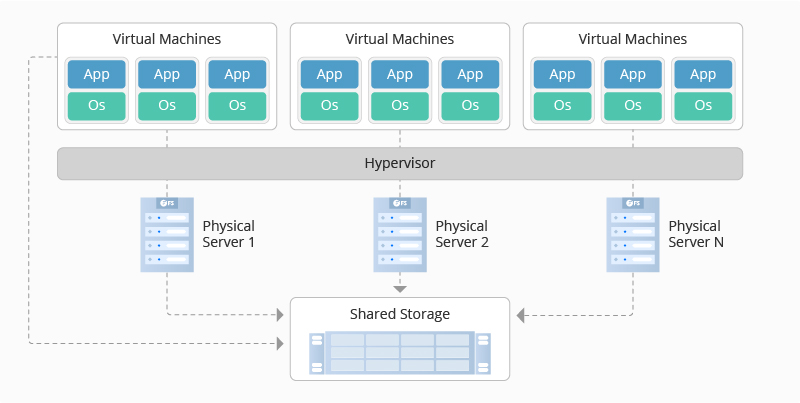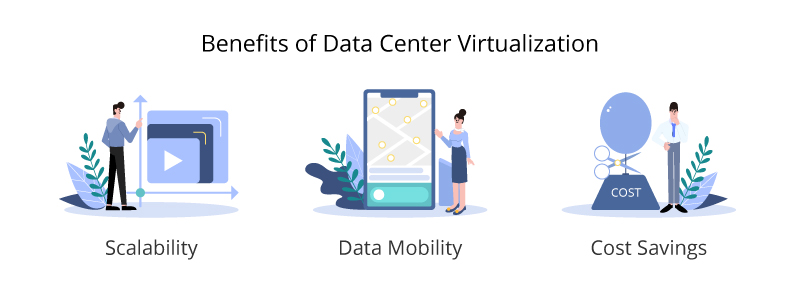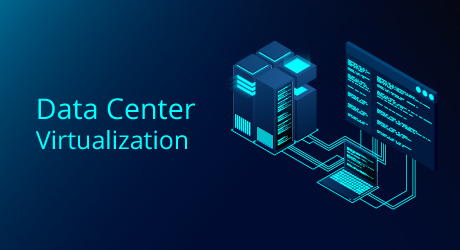In today’s world, businesses are becoming more and more dependent on technology to drive their operations. One critical piece of technology infrastructure that is becoming increasingly important is the data center. With the growth of cloud computing and the increasing complexity of applications and systems, traditional data center models are no longer sufficient. This is where data center virtualization comes in. In this blog, we’ll explore data center virtualization and its various use cases.
What is Data Center Virtualization?

Data center virtualization is the process of creating a virtual version of a data center that can be used to run multiple virtual machines (VMs). It involves separating the physical hardware of a data center into multiple virtual environments, each with its own operating system, applications, and data. This allows for increased flexibility and scalability, as well as improved resource utilization.
Use Cases of Data Center Virtualization:
- Server Consolidation: Data center virtualization allows for the consolidation of multiple physical servers into a single virtualized server. This leads to reduced hardware and maintenance costs, as well as increased efficiency.
- Disaster Recovery: By creating a virtualized backup of critical applications and data, businesses can ensure that they have a reliable disaster recovery plan in place. Virtualization also allows for faster and easier restoration of services in the event of an outage or disaster.
- Testing and Development: Data center virtualization allows for the creation of isolated test and development environments, which can be used to test new applications, software updates, and other changes before they are rolled out to production environments.
- Cloud Computing: Data center virtualization is a key component of cloud computing, allowing for the creation of scalable, on-demand infrastructure that can be provisioned and de-provisioned as needed
Pros of Data Center Virtualization

- Increased Efficiency: By running multiple virtual machines on a single physical server, data center virtualization allows for better utilization of resources, leading to increased efficiency and reduced costs.
- Improved Scalability: Virtualization allows for the easy creation and provisioning of new virtual machines, making it easy to scale up or down as needed.
- Reduced Hardware Costs: With data center virtualization, fewer physical servers are required, reducing the need for hardware and associated maintenance costs.
- Improved Disaster Recovery: By creating a virtualized backup of critical applications and data, businesses can ensure that they have a reliable disaster recovery plan in place.
- Simplified Management: With virtualization, the management of servers, applications, and data is simplified, as everything can be managed from a single console.
Cons of Data Center Virtualization
- Increased Complexity: Virtualization adds a layer of complexity to the infrastructure, requiring specialized knowledge and skills to manage.
- Risk of Resource Overcommitment: When virtual machines are provisioned, there is a risk of overcommitting resources, which can lead to performance issues.
- Single Point of Failure: When multiple virtual machines are running on a single physical server, there is a risk of a single point of failure, which can lead to downtime and data loss.
- Performance Overhead: The virtualization layer can introduce performance overhead, which can affect the performance of applications running on virtual machines.
- Security Risks: With virtualization, there is a risk of security breaches, as multiple virtual machines are running on a single physical server.
Conclusion
Data center virtualization offers many benefits, including increased efficiency, improved scalability, and reduced hardware costs. However, it also has its share of challenges, including increased complexity, performance overhead, and security risks. Data center virtualization is a critical technology for modern businesses, offering improved efficiency, scalability, and flexibility. By consolidating physical servers, creating virtualized disaster recovery environments, and providing isolated testing and development environments, data center virtualization allows businesses to reduce costs and improve performance. Additionally, data center virtualization is a key enabler of cloud computing, providing the infrastructure needed for scalable, on-demand computing resources. With the increasing complexity of modern applications and systems, data center virtualization is becoming a necessity for businesses of all sizes.As with any technology, it is important to carefully consider the pros and cons of data center virtualization before adopting it. With the right planning and management, however, data center virtualization can be an effective tool for modern businesses, allowing them to improve performance, reduce costs, and improve their disaster recovery capabilities.

